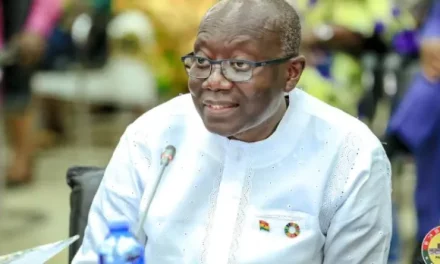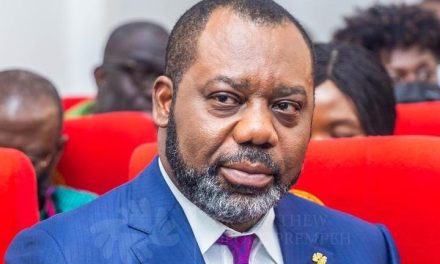
Financial-Economic Policies Crucial For Trade And Industries – Deputy Trade Minister3 min read


Dr. Stephen Amoah, Deputy Minister for Trade and Industry
In a recent seminar organised by the Financial-Economics Institute in Ghana, Dr. Stephen Amoah, the deputy minister for trade and industry, addressed the significant impact of financial-economic policies on trade and industries in developing economies.
The seminar was aimed at exploring strategies and solutions to enhance the growth and sustainability of these sectors in Ghana.
Dr. Amoah stressed the importance of selecting expenditure items that ensure low poverty levels while having a high correlation with GDP growth. He emphasised the need for correlational analysis between expenditure items and Ghana’s growth, using data from reliable sources. This approach will ensure efficient allocation of resources and support debt sustainability and fiscal space consolidation.
One of the key recommendations put forth by experts at the seminar was considering alternative energy sources to support industries. This move would not only alleviate the burden of expensive energy options but also contribute to a more sustainable and environmentally-friendly economy.
The banking industry was highlighted as a critical player in Ghana’s economic development policy framework. Dr. Amoah urged closer engagement with banking institutions to establish a model that supports the growth of Micro, Small and Medium Enterprises (MSMEs). Recognising their significant contribution to employment and economic activity, he emphasised the need to provide MSMEs with a larger space within the country’s economic framework.
Addressing the issue of borrowing on the domestic market, Dr. Amoah called for a reversal of the current trend wherein government borrows at higher rates than current market rates. This adjustment will create a more balanced and favourable lending environment for businesses.
To foster entrepreneurship in Ghana, Dr. Amoah stressed the importance of strengthening the entrepreneurial ecosystem. This includes providing entrepreneurs, investors, traders and business actors with not only access to affordable capital but also the necessary capacity to sustainably manage their activities.
Furthermore, Dr. Amoah highlighted the need for government policies that create a competitive edge for opportunities within the sub-region, sub-Saharan Africa and the world. He suggested a review of Ghana’s import-driven policy framework to stimulate local industries and reduce dependence on foreign goods.
“Redefining our industrial value chains to meet international standards is crucial,” stated Dr. Amoah. This approach will enhance Ghana’s competitiveness in the global market and promote sustainable growth in the manufacturing sector.
The deputy minister also emphasised the importance of a realistic tax-generation policy. By addressing tax leakages and enhancing the tax base, Ghana can strengthen its fiscal position and effectively support trade and industries.
Dr. Amoah concluded his address by advocating a revised tariffs policy to support Ghana’s import substitution-driven agenda. He called for an open culture system that involves stakeholders from various sectors collectively contributing to policy formulation and decision-making processes.
The seminar participants acknowledged the relevance of these issues and their potential impact on Ghana’s trade and industries. They recognised that managing fiscal and monetary policies appropriately is vital for sustainable economic growth and development.
As Ghana aims to strengthen its trade and industrial sectors, policymakers, industry leaders and experts must work together on implementing recommendations proposed during the seminar. By adopting a comprehensive and strategic approach, Ghana can position itself as a competitive player in the global market while fostering inclusive and sustainable economic growth.




















